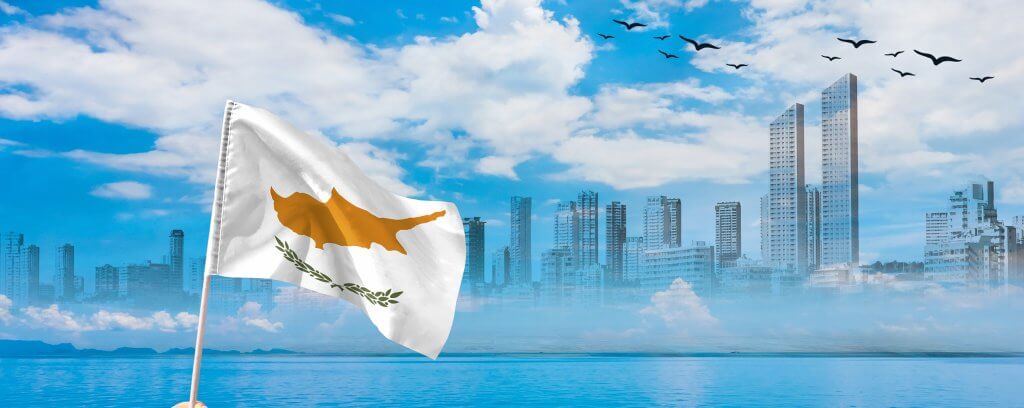Cyprus is a Mediterranean island that combines natural beauty, deep-rooted history, and dynamic economic development. Thanks to its strategic location and appealing environment, Cyprus has become a desirable destination for living, working, and investing. In this article, we’ll walk you through everything you need to know about Cyprus.
Cyprus’ Strategic Location and Infrastructure: A Gateway to Real Estate Profit in the Heart of the Mediterranean
Below are the key factors that make Cyprus’ strategic location and infrastructure a powerful gateway to real estate returns in the Mediterranean:
Prime Geographic Location
Cyprus is situated at the crossroads of three continents, Europe, Asia, and Africa, with a total area of 9,251 km², making it the third-largest island in the Mediterranean. Located between latitude 34° 33’–35° 34’ North and longitude 32° 16’–34° 37’ East, it lies approximately 65 km south of Turkey, 100 km west of Syria, and 770 km southeast of Greece, positioning it as a significant commercial hub.Advanced Infrastructure
Cyprus boasts modern infrastructure that creates an attractive environment for real estate investment. Here’s an overview:
- Modern International Airports
Cyprus is home to modern international airports, ensuring easy accessibility and boosting its appeal to investors:- Larnaca International Airport (LCA): Handles over 8 million passengers annually.
- Paphos International Airport (PFO): Accommodates more than 3 million passengers each year.
- Modern International Airports
Both airports are part of a comprehensive expansion plan following an agreement signed on December 23, 2024. The goal is to increase passenger capacity to 17 million annually (up from current levels), enhance traveler experience, stimulate commercial activity, and expand overall airport capabilities. The table below summarizes the expansion plan:
| Airport | Budget Allocation | New Capacity | Key Enhancements |
| Larnaca International | €95 million | 12 million passengers/year | – Terminal expansion (East & West) – Upgrades in passport control & security – Additional departure gates & retail spaces – Two new baggage carousels |
| Paphos International | €75 million | 5 million passengers/year | – New supplementary runway – Terminal expansion with added immigration section & baggage areas – Improved security and migration zones |
- Waterfront Developments
Cyprus has launched a comprehensive waterfront infrastructure plan, including the transformation of Larnaca’s seafront. Its first phase includes the “Land of Tomorrow” project, described in the table below:
| Project Scope | Details |
| Area Transformation | Redevelopment of a former industrial zone into a modern, multi-use urban destination |
| Investment Value | €1 billion |
| Total Area | 400,000 m² |
| Design | Features retail spaces, promenades, restaurants, cafés, a five-star luxury hotel, a state-of-the-art conference center, private offices, coworking spaces, and event venues |
| Residential Units | In the first phase, two buildings will house 150–200 apartments, with completion expected between 2028–2029. Building heights will not exceed 15 floors. |
| Uses | Residential, commercial, hospitality, and entertainment purposes |
- Seaports in Cyprus
Cyprus is home to several seaports, which are continuously undergoing development and enhancements. The table below outlines their key details:
| Port | Location | Area |
| Larnaca Port | Southeast Cyprus | 445,000 m² |
| Limassol Port | Southern Cyprus | 1.3 km² (land), 1 km² (water) |
| Paphos Port | Southwest Cyprus | – |
- Transportation and Road Network
Cyprus has a primary road network spanning 1,319 km, connecting major cities such as Nicosia, Limassol, Larnaca, and Paphos. In support of infrastructure development, several initiatives have been launched:
- A comprehensive upgrade project funded with €100 million from the European Investment Bank.
- Additional projects under the Ministry of Transport, with a 2025 budget of €789.593 million, reflecting a 19% increase compared to the previous year.
- Sustainable Urban Mobility Plans (SUMPs) in Limassol and Larnaca, aiming to reduce greenhouse gas emissions by 55% by 2030, promote clean energy, and encourage low-carbon transportation solutions.
- A comprehensive upgrade project funded with €100 million from the European Investment Bank.
Cyprus Population and Demographic Distribution
The population in the government-controlled areas of Cyprus was estimated at approximately 966,400 by the end of 2023, reflecting a 1.8% increase compared to 2022. This growth is attributed to the comprehensive development and modernization strategy implemented by the authorities across various sectors, aiming to establish a distinctive lifestyle aligned with European standards.
Cyprus is known for its multicultural environment and its openness to diversity, hosting residents from various nationalities. Below is a breakdown of the population by nationality:
Population Distribution by Nationality
| Category | Population | Percentage |
| Cypriots | 719,252 | 77.9% |
| EU Citizens (excluding Cypriots) | 93,540 | 10.1% |
| -Greek | – | 4.7% |
| -Romanian | – | 2.2% |
| -Bulgarian | – | 1.8% |
| Non-EU Citizens | 107,168 | 11.6% |
| -United Kingdom | – | 2.0% |
| -Syria | – | 1.4% |
| -Russia | – | 1.3% |
Foreign investors account for over 50% of the real estate investment market in Cyprus, with a wide geographic distribution across various regions. Below is a breakdown of foreign residents by region:
Percentage of Foreign Residents by Region in Cyprus
| Region | Percentage of Foreign Residents |
| Paphos | 40% |
| Famagusta | 23.6% |
| Limassol | 21.7% |
| Larnaca | 19.2% |
| Nicosia | 17.3% |
A Rich History and Vibrant Culture
Invest in the island of Cyprus, where ancient history meets a constantly evolving culture to create an exceptional and truly unique experience. Cyprus is a crossroads of civilizations—where Greek, Roman, and Ottoman influences have intertwined to form a rich cultural tapestry that can be felt in every corner of the island.
According to Encyclopaedia Britannica, Cyprus is one of the most historically significant islands in the Mediterranean, having witnessed the convergence of civilizations throughout the centuries. This has shaped a distinct cultural identity that captivates both visitors and investors alike.
UNESCO has recognized several sites in Cyprus as World Heritage Sites, further underscoring the island’s unique historical and architectural value. This cultural legacy continues to attract investors and tourists seeking experiences that blend natural beauty with historical depth.
If you’re looking to invest in a dynamic environment that harmoniously blends authenticity with modernity, Cyprus offers you endless opportunities to become part of a living heritage—one that thrives on creativity and renewal.
European-Standard Quality of Life
Cyprus stands as a leading example of delivering a high quality of life that blends authenticity with modernity, aligned with European standards. The island offers an ideal balance between healthcare services and social sustainability, making it a top destination for both living and investment.
- Healthcare Services
Cyprus offers a fully integrated healthcare system (GHS), which is continuously evolving to meet international standards. This development is in collaboration with the Cyprus Medical Association and the National Institute for Health and Care Excellence (NICE). Recent improvements include expanded diagnostic, laboratory, and surgical services, the establishment of new hospitals and care centers, and the introduction of systems to reduce wait times for specialized consultations.
A study by the International Labour Organization confirms that the healthcare system is financially sustainable until at least 2031, with reserves estimated at €590 million as of 2023. - Educational Services
If you’re looking for an education system that meets European standards while nurturing creativity and innovation, Cyprus offers that and more. The educational system combines global quality with local attention to detail, adding international value to the learning experience and enhancing future employability and innovation. - Preschool, Primary, and Secondary Education
Public education in Cyprus is free at all general stages, with private schools also available offering international curricula or language-focused programs (e.g., English). Many private schools follow global teaching standards such as the International Baccalaureate (IB) and IGCSE systems. - Higher Education
Cyprus is home to several internationally recognized public and private universities, including the first British university in Cyprus: UCLan Cyprus in Larnaca. The country also hosts a variety of technical colleges and institutions that meet both local and regional labor market needs.
New legislation now facilitates the establishment of foreign university branches in Cyprus, applying academic, financial, and operational standards equivalent to local institutions, as reported by Cyprus Mail. These universities actively collaborate with European and international partners to enhance academic and research programs.
Cyprus vs. EU Education Performance Indicators
| Indicator | Cyprus | EU Average |
| Education expenditure as % of GDP | 6.2% | 5.5% |
| Tertiary education enrollment rate | 70% | 65% |
- Safety and Social Stability
Cyprus consistently ranks among the world’s safest and most socially stable countries—making it an ideal choice for investors seeking a secure and high-quality environment aligned with European living standards. The table below highlights Cyprus’s rankings across key safety and quality-of-life indices:
| Indicator | Ranking / Score |
| Global Safety Index | Ranked #5 worldwide |
| Global Peace Index 2024 | Scored 1.9, ranking 28th out of 163 countries |
| Human Development Index (HDI) 2024 | Scored 0.888, reflecting high living standards in health, education, and income—surpassing the EU average |
Affordable Cost of Living
If you’re wondering, “Is living in Cyprus expensive?”, according to Numbeo, the average monthly cost of living for a single person in Cyprus is approximately €873.0 (excluding rent). For a family of four, the average cost reaches around €3,081.3, also excluding rent.
A Stable Economy with Promising Investment Opportunities
Cyprus offers an attractive investment climate that continues to draw global investors, thanks to its stable economy, investment incentives, and supportive legal frameworks. Here’s a comprehensive look:
- A Diverse and Stable Economy
Cyprus enjoys a well-balanced economic structure based on tourism, financial services, and real estate. Since joining the European Union in 2004, the island has experienced significant growth supported by investment-friendly policies and tax exemptions for investors. - Real Investment Advantages
- Competitive Tax System: Cyprus has one of the lowest corporate income tax rates in the EU.
- Transparent Legal Framework: Investor rights are protected, ensuring a safe and secure business environment.
- Future Growth Potential: The real estate market is projected to grow by up to 5% annually while inflation continues to decline steadily.
Cyprus represents a promising option for those seeking an ideal balance between a high quality of life and a secure real estate investment. The island offers exceptional advantages, from reasonable living costs and competitive salaries to stunning natural landscapes, a rich cultural heritage, and a stable legal and economic environment that provides foreigners with ample opportunities for property ownership and residency.
At Reach, Cyprus was the ideal choice for our exclusive development project. Discover the full details of our real estate investment, Pyla Pearl, located in Larnaca, Cyprus.



